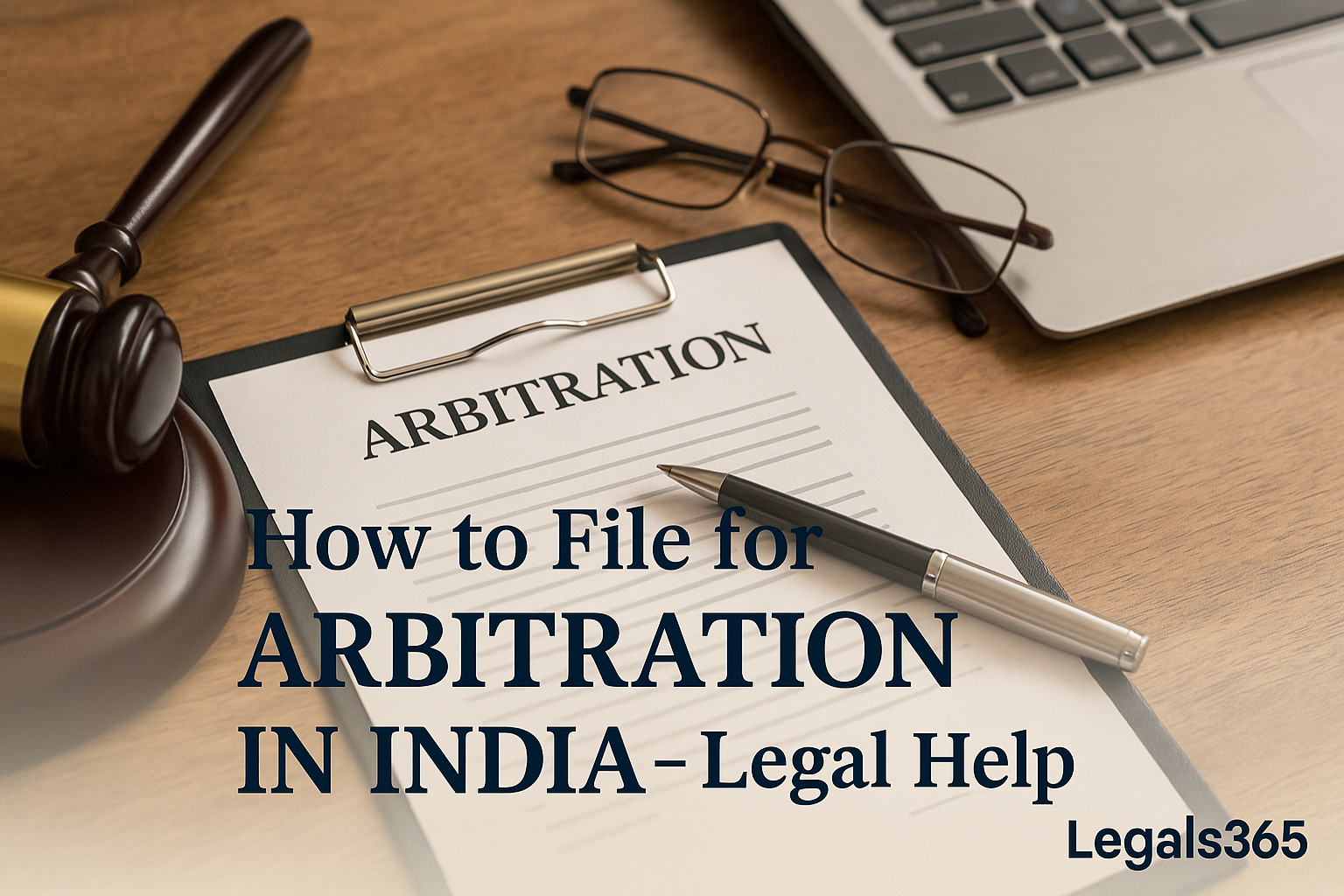
How to File for Arbitration in India – Legal Help Guide
Introduction
Disputes are a part of life—be it in business, partnerships, employment, or property. However, not every conflict needs to escalate to court battles. In India, arbitration has emerged as a popular, efficient, and cost-effective method for resolving disputes outside the traditional courtroom. It’s fast, less formal, and offers privacy.
But how exactly do you file for arbitration in India? What does the process look like? And when should you consider seeking help from professionals like Legals365?
In this article, we’ll break down the essentials of arbitration in India, guide you step-by-step through the filing process, and explain how legal support can make a critical difference in your case.
What is Arbitration?
A Quick Overview
Arbitration is a form of Alternative Dispute Resolution (ADR) where parties agree to resolve their dispute through a neutral third party—called the Arbitrator—instead of going to court. The arbitrator’s decision, known as an award, is legally binding and enforceable.
Arbitration in India
The legal framework for arbitration in India is governed by the Arbitration and Conciliation Act, 1996, which has been amended multiple times to make it more pro-arbitration and efficient.
Why Choose Arbitration?
- Confidential proceedings
- Quicker resolution than courts
- Less expensive
- Neutral decision-making
- Greater flexibility in procedures
When Should You Consider Arbitration?
Arbitration is ideal when:
- There’s an arbitration clause in a contract.
- Both parties agree to submit the dispute to arbitration.
- You want a quicker resolution.
- The matter is commercial, civil, or contractual in nature.
Note: Criminal matters, matrimonial disputes, and consumer protection issues are generally not arbitrable.
How to File for Arbitration in India
Step 1: Check for Arbitration Clause
Most commercial and contractual agreements include an arbitration clause. This clause typically outlines:
- The number of arbitrators
- The seat and venue of arbitration
- Applicable laws
- Language of proceedings
If your contract lacks this clause, parties can still mutually agree to arbitrate.
Step 2: Send a Notice of Arbitration
The arbitration process begins with a Notice of Arbitration, which:
- Notifies the opposing party of the intent to initiate arbitration
- Contains basic details: nature of the dispute, claims, reliefs sought
- Suggests the name(s) of the arbitrator(s)
This is a crucial legal document and should be drafted carefully.
Tip: Legal professionals like Legals365 can help you prepare an effective Notice of Arbitration to avoid rejection.
Step 3: Appoint the Arbitrator
- If there is one arbitrator: mutual appointment
- If there are three: each party appoints one, and both selected arbitrators appoint the third
- If parties can’t agree: courts may step in to appoint the arbitrator
Under Section 11 of the Arbitration Act, parties can approach the High Court or Supreme Court for the appointment.
Step 4: Draft and Submit the Statement of Claim
The Statement of Claim includes:
- Background of the dispute
- Factual matrix
- Legal arguments
- Relief sought
Respondent files a Statement of Defense in response.
All this involves a legal narrative, supported by contracts, correspondence, invoices, and any other documentary evidence.
Step 5: Conduct of Proceedings
Arbitration proceedings can be:
- Institutional (e.g., under ICA, SIAC, LCIA)
- Ad-hoc (no formal institutional rules)
The arbitrator may decide:
- Whether to have oral hearings
- Timelines for submissions
- Interim reliefs
Everything is documented and guided by natural justice and procedural fairness.
Step 6: Arbitration Award
After considering all evidence and arguments, the arbitrator issues a binding award. This decision is enforceable under Section 36 of the Arbitration Act.
Step 7: Enforcement or Challenge
- If no challenge is raised within 90 days, the award becomes final.
- Awards can be challenged under Section 34 for limited grounds: fraud, bias, breach of natural justice, etc.
Timeframe for Arbitration in India
As per the 2019 amendment to the Arbitration Act:
- Domestic arbitration must be completed within 12 months (extendable by 6 months with mutual consent).
- Fast-track procedures are available for quicker resolutions.
Documents Required
- Original contract with arbitration clause
- Notice of Arbitration
- Statement of Claim/Defense
- Evidence (invoices, emails, letters, etc.)
- Appointment agreement of arbitrator
- Proof of communication with the opposite party
Cost of Filing for Arbitration in India
Costs vary depending on:
- Value of the dispute
- Number of arbitrators
- Type of arbitration (institutional/ad-hoc)
- Location of hearings
Typical Components:
- Arbitrator’s fee
- Legal counsel’s fee
- Venue charges (if applicable)
- Documentation and filing costs
Using online arbitration services and legal experts like Legals365 can significantly reduce costs while ensuring professional drafting and support.
How Legals365 Can Help
Legals365 is your trusted legal companion for filing arbitration cases in India. Here’s how we support you:
- Expert Drafting: We help you draft arbitration clauses, notices, and claims.
- Arbitrator Appointment: Assistance in appointing neutral and experienced arbitrators.
- Document Review: Thorough review of contracts and supporting documents.
- End-to-End Arbitration Support: From initial notice to enforcement of award.
- Affordable and Transparent Pricing: No hidden charges—only honest, affordable legal help.
- Nationwide Services: Serving clients across all major Indian cities.
Whether you’re a startup, business, or individual, Legals365 ensures that your arbitration filing is smooth, strategic, and legally sound.
Conclusion
Filing for arbitration in India doesn’t need to be overwhelming. With a clear understanding of the Arbitration Act, a structured approach, and professional legal help, you can resolve disputes faster, cheaper, and more privately than traditional litigation.
Remember: A well-drafted arbitration clause and a carefully filed Notice of Arbitration can make all the difference.
Legals365 and Online Noida brings together legal expertise and digital convenience to help you navigate the arbitration process from start to finish.
Don’t let legal complexities stop you from resolving your dispute—get started with Legals365 today.
Hashtags
#ArbitrationIndia #DisputeResolution #LegalHelpIndia #FileArbitration #Legals365 #OnlineLegalSupport #ArbitrationFilingGuide #ADRIndia #LegalServicesIndia #ArbitrationLawyers #ArbitrationNotice #LegalDraftingIndia #FastLegalResolution #IndianArbitrationProcess #CommercialDisputesIndia #OnlineNoida
